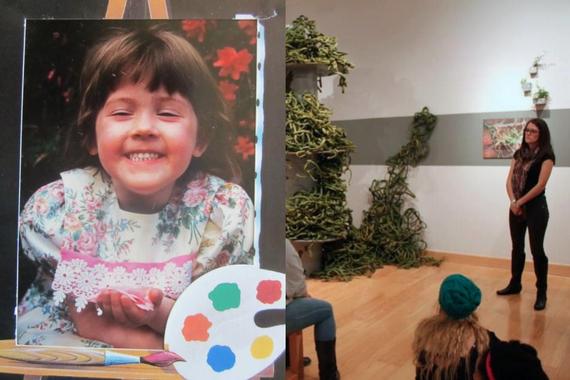Optimism. Grit. Perseverance. Mindset. Volumes of educational rhetoric revolve around these ideas. Sure, I intentionally spend time teaching my visual art students about a growth mindset, but these theories don't quite explain the feelings of frustration that I witness daily in my students and now recognize in my past.
That is, until I watched a 2009 clip of Ira Glass explaining "the gap" that plagues creative work. (In addition to reading, I strongly encourage you to watch the video, as my transcription cannot include the same emotion and emphasis.)
Here's Glass:
I really wish somebody had told this to me... All of us who do creative work, we get into it because we have good taste... but it's like there's a gap for the first couple years that you're making stuff, when what you're making isn't so good... It's trying to be good, it has ambition to be good, but it's not quite that good... But your taste, the thing that got you into the game, your taste is still killer. And your taste is good enough that you can tell that what you're making is kind of a disappointment to you. You know what I mean?
Yep.
Almost immediately I shared this clip with my students. Afterwards, I wanted to tell them about how I felt when I started making art, but I couldn't. I know that under the influence of a creative family and the guidance of great teachers I went from being the aspiring artist at left to the emerging one at right.
Unfortunately, I don't really remember those first few years of artistic growth. So instead, I shared with my students my vivid memories of what it was like to start teaching.
For those of you that aren't teachers and are wondering why I'm discussing teaching in the context of creative work, you should know that teaching requires a great deal of imagination and innovation. In spite of the unavoidable bureaucratic procedures, the actual instructional time is undoubtedly an art. I could never perform another educator's lesson plan exactly as intended because teaching is a dialogue, not a speech. Teaching is influenced by personality, interests, and of course the students themselves. The content might be dictated, but the delivery never is.
So I told my students that when I first started teaching, I was just desperately trying to make it through the next class period, then the next day, then the next week. It's one thing to write one really good lesson plan, but it's a whole different challenge to write a good one every day for 180 days for multiple different courses, not to mention all the variables that I didn't have enough experience to react to or plan for. But then something worse happened: suddenly I knew enough to know that what I was doing wasn't good enough. At least, measured by my own standards.
For most beginning teachers, no one has to tell you about your shortcomings; you just know. You know that as hard as you're working, you haven't yet mastered this magical combination of a million tiny little things that veteran teachers do exceptionally without even thinking.
Glass knows from experience how to get past the frustration of that gap:
A lot of people never get past that phase. A lot of people, at that point they quit. And the thing I would say to you with all my heart is that most everybody I know who does interesting creative work, they went through a phase of years where they had really good taste, they could tell what they were making wasn't as good as they wanted it to be. They knew it fell short... It didn't have this special thing that they wanted it to have. Everybody goes through that... You've got to know it's totally normal and the most important possible thing you can do is do a lot of work. Do a huge volume of work... It's only by actually going through a volume of work that you're actually going to catch up and close that gap. And the work you're making will be as good as your ambition.
My students stared back at me that day, perplexed. I imagine they were confounded by the "my teacher is actually a human" realization. We didn't discuss the gap much further; I let them sit with it.
However, over a week later, I still notice marked differences in my students' attitudes and how they talk about their process and goals.
If you're a beginning teacher reading this, I promise you will clear the gap soon enough. Hopefully, the journey of lifelong learning will never end, but suddenly the learning curve doesn't seem so steep.
Previously published at KatherineMeeks.org
Follow Katherine Meeks on Twitter: www.twitter.com/KatherineMeeks

